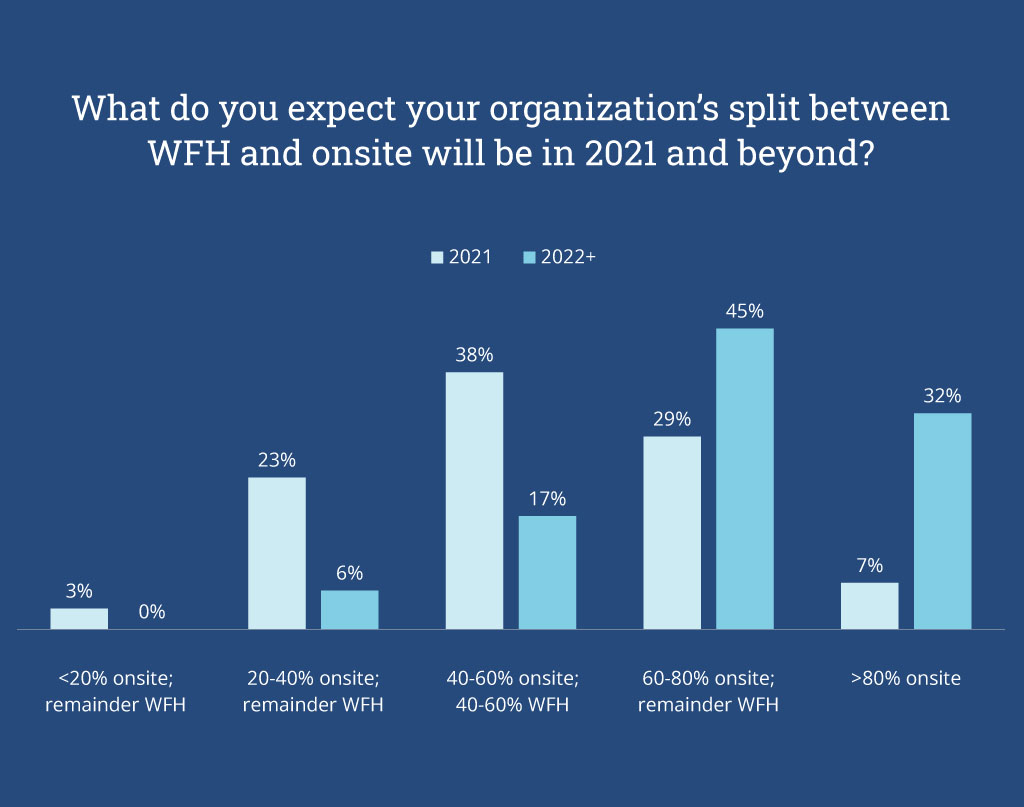Companies have accelerated their move to cloud-based HR platforms amid the pandemic and say they are expecting adoption to grow in the coming years, a new survey* finds.
The ISG survey of 260 companies worldwide found 46 percent using an HR Software-as-a-Service (SaaS) platform or hybrid solution, up from the 20 percent who said they were using a cloud-based solution two years ago. Looking to the future, the survey found 57 percent of organizations expect to be using a subscription-based SaaS or hybrid solution by 2023.
Stacey Cadigan, partner, ISG HR Technology: “In 2020, the COVID-19 pandemic changed work in unimaginable ways and put increased focus on the potential of HR SaaS technologies to better engage employees, support a virtual workforce, improve productivity and enable a more agile HR model,” said Cadigan. “Our survey reveals growing interest in HR SaaS, as more and more companies are realizing measurable business value from a platform-based approach.”
The survey found 64 percent of companies say they are achieving measurable business value from their investment in HR SaaS platforms, up 23 percentage points, or about 50 percent, since 2019, the last time ISG conducted the survey. Business value is determined by a range of metrics, including productivity, cost savings and employee retention.
Among the measures of business value, the survey found organizations achieving significant HR cost savings from moving to HR SaaS solutions, with 70 percent reporting savings of 10 percent or more, and 37 percent achieving savings of 20 percent or more.
“HR has been on the frontlines throughout the pandemic, one of the most stressful events in recent history,” said Deb Card, partner, ISG HR Technology, and co-author of the report. “HR technologies delivered value by enabling real-time, data-driven decision-making, fostering connections and collaboration among employees in a remote work environment, monitoring performance, productivity and engagement, and enabling virtual recruiting, onboarding and offboarding.”
Many leading SaaS HR solutions added COVID-specific functionality to comply with new payroll legislation, track COVID cases and help manage the return to work, Card noted.
The study found a strong correlation between an organization’s success at aligning its service delivery model and processes with its new HR platform and its ability to achieve business results.
Companies are fairly evenly split between their use of internal shared services and outsourcing delivery models, but the report shows a clear migration toward outsourcing since the 2019 and 2017 reports. Among the 11 HR functions analyzed, the greatest move toward outsourced or hybrid delivery models was in the areas of payroll and health and wellness benefits administration.
In the wake of the pandemic, the survey found nearly seven in 10 organizations expect a significant percentage of their employees (more than 20 percent) to work from home in 2022 and beyond, with the most common view that between 20 and 40 percent will work from home. This will necessitate greater investment in HR technology, tools and policies to support a long-term work-from-home strategy.
“The COVID-19 pandemic refocused HR on the need for workforce planning data and analytics, including real-time data on absences and employee sentiment, as well as the ability to plan and execute furloughs and return-to-work events,” said Kelly Will, director, ISG HR Technology, and report co-author. “Almost 40 percent of organizations say they have been very successful in fostering a data-driven culture in HR, with an additional quarter of respondents describing themselves as moderately successful.”
Will said advancements in HR analytics are encouraging, but plenty of opportunity remains to leverage enterprise-wide HR metrics. “Using data to drive action requires a change management effort to build skills and habits, embed analytics into daily work and take advantage of new analytics capabilities,” she said.
*ISG HR Technology









